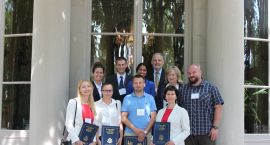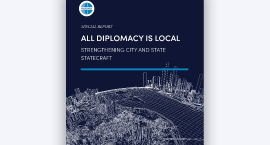It’s logical to assume a certain level of dissatisfaction with the world in which we live. Everything we see in the news and in newspapers is essentially bad news. The world in the 21st Century is experiencing significant problems that need to be addressed, as we all know. Every day we hear of terrorist attacks and/or religious extremism; disasters which are directly linked to climate change (or global warming, as we used to call it); the economic crises and recessions; health challenges as a result of obesity in many developed countries; armed conflicts; and territory disputes – these are just a few of the occurrences that we witness everyday around the world.
History is clear. The 20th Century was one of many challenges, including economic depressions; two world wars; genocides; and the arrival of dozens of new states into the world arena. However, in the face of all of this bad news, there is a huge ray of hope. Some call it “pragmatic optimism”. I call it viewing the world from the perspective that all change is accompanied by some level of chaos, and the world is actually a better place today than it was last year, last decade or even last century.
For starters, economies around the world are growing…faster! The growth rate for the economies of at least 80 countries stands at least 4%, and some countries such as Mongolia and Libya are experiencing annual growth rates of over 12%. The world economy will grow 10-20% faster than it grew in the past decade; 60% faster than it did two decades ago; and five times faster than it did three decades ago. An associated benefit of economic growth is the increased capacity of countries to reduce levels of poverty.
While, we are still in the unfortunate position of seeing that almost half the world’s population lives on less than $2 a day, and more than billion people live on less than $1 a day, the UN has established that poverty has dropped more in the last fifty years than it had in the past five hundred years. In addition, life expectancy has increased in every country in the world thanks to the advancement in quality of life, nutrition, medicine and hygiene. This has enabled more and more people around the world to have access to education.
The number of college graduates worldwide has increased fourfold in the last forty years for men, and seven times for women. Studies and research have shown overwhelmingly that women are smarter than men. Joseph Nye, a prominent political scientist at Harvard University, argues that the political and corporate world is experiencing a shift towards what is known as a “feminine style of leadership.” Feminine styles of leadership tend to be, by nature, more collaborative, participatory, integrated and inclusive with the behavior of others, while male styles of leadership tend to be more assertive, competitive, authoritarian, and focused on commanding the behavior of others.
Sustainable economic development also goes hand in hand with the development and empowerment of women. Rwanda is a perfect example of this. This African country has been the first in the world where women hold more than half of the seats in Parliament. The Rwandan Government, together with non-governmental organizations (NGOs), has successfully dealt with the pressing economic, social and political challenges, and can point to fivefold increase in GDP per capita in the last fifteen years. The rise of NGOs has, no doubt, helped to pave the way for development in many countries and have even contributed to facilitate governments to take control of their own decisions and stabilize the rule of law. This is also why governments around the world collaborate with NGOs in many of their policy-making decisions.
Technological development must also be given credit for increasingly integrating the world and its actors. Currently, there are more people in India who have cell phones than there are Indians with access to private toilets. 50% of Africans have cellphones, which has allowed them to access economic assistance and better services for themselves and their families. Moore’s Law states that computing power will double in eighteen months, while the cost of it is will be halved. This brings me great hope and excitement for the future of global connectivity.
But there is one pivotal factor that ties all of these developments together – the work of global leaders who are committed to developing innovative, collaborative solutions to the world’s complex social, economic, and political challenges.
As a global leadership organization, Meridian interfaces every day with government and corporate leaders who are committed to shaping a better world. On a daily basis, we see how the power of exchange allows leaders to make better decisions and create sustainable change which improves the quality of life of communities and countries around the world. We must never forget the power that one individual may have in creatively solving problems that need immediate attention. As an intern, I am proud to be involved in an organization that is peacefully building bridges of understanding and providing a neutral forum for dialogue and communication. Our responsibility is great, but our possibilities are far greater.
The information was gathered through a variety of sources, including: The Case for Optimism, Fareed Zakaria’s Commencement Speech at Harvard, The Economist and the CIA World Factbook.
















